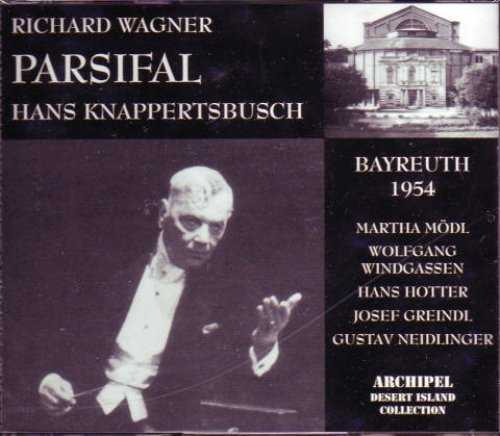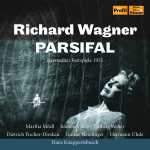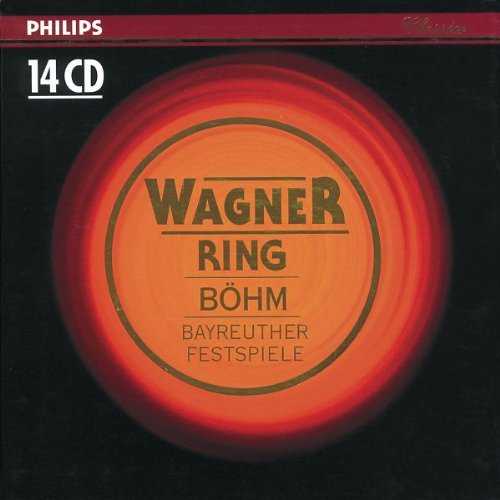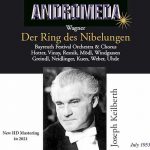
Orchestra: Bayreuth Festival Orchestra
Conductor: Hans Knappertsbusch
Composer: Richard Wagner
Audio CD
Number of Discs: 4
Format: FLAC (image+cue)
Label: Archipel
Size: 655 MB
Recovery: +3%
Scan: no
Amfortas – Hans Hotter
Parsifal – Wolfgang Windgassen
Kundry – Martha Mödl
Titurel – Theo Adam
Gurnemanz – Josef Greindl
Klingsor – Gustav Neidlinger
Altsolo – Hetty Plümacher
Gralsritter – Gene Tobin, Theo Adam
Knappe – Hetty Plümacher, Gisela Litz, Hugo Kratz, Gerhard Stolze
Blume – Ilse Hollweg, Friedel Pöltinger, Hetty Plümacher, Dorothea Siebert, Jutta Vulpius, Gisela Litz
Live recording in mono from
Festspielhaus Bayreuth
August 5, 1954
Disc: 1
01. Act 1. Vorspiel
02. Act 1. He! Ho! Waldhüter ihr
03. Act 1. Toren wir, auf Lind’rung da zu
04. Act 1. Hier! Nimm du! Balsam
05. Act 1. Recht so! Habt Dank! Ein wenig Rast
06. Act 1. ‘Durch Mitleid wissend’ – war’s nicht so?
07. Act 1. He! Du da! Was liegst du dort wie ein wildes Tier?
08. Act 1. Das ist ein and’res, jedem ist’s verwehrt
09. Act 1. Titurel, der fomme Held, der kannt’ ihn wohl
10. Act 1. Wor allem nun, der Speer kehr’ uns zurück!
11. Act 1. Weh’! Weh’! Hoho! Auf! Wer ist der Frevler?
12. Act 1. Wirst deiner Sündentat du inne?
13. Act 1. Ich hab’ eine Mutter, Herzeleide sie heißt
14. Act 1. Nie tu’ ich Gutes, nur Ruhe will ich
Disc: 2
01. Act 1. Vom Bade kehrt der König heim
02. Act 1. Zum letzten Liebesmahle
03. Act 1. Mein Sohn Amfortas, bist du am Amt?
04. Act 1. Des Weihgefäßes göttlicher Gehalt
05. Act 1. Enthüllet den Gral!
06. Act 1. Oh! Heilige Wonne
07. Act 1. Selig im Glauben!
08. Act 1. Was stehst du noch da?
Disc: 3
01. Act 2. Vorspiel
02. Act 2. Die Zeit ist da
03. Act 2. Ach! Ach! Tiefe Nacht! Wahnsinn!
04. Act 2. Furchtbare Not!
05. Act 2. Seine Wunde trägt jeder nach heim!
06. Act 2. Hier war das Tosen
07. Act 2. Ihr schönen Kinder, mußt’ ich sie nicht schlagen?
08. Act 2. Komm! Komm! Holder Knabe!
09. Act 2. Parsifal! Weile!
10. Act 2. Dies alles hab’ ich nur geträumt?
11. Act 2. Ich sah das Kind an seiner Mutter Brust
12. Act 2. Wehe! Wehe! Was tat ich?
13. Act 2. Amfortas! Die Wunde!
14. Act 2. Gelobter Held!
15. Act 2. Nun such’ ich ihn von Welt zu Welt
16. Act 2. Auf Ewigkeit wärst du verdammt
17. Act 2. Halt da! Dich bann’ ich mit der rechten Wehr!
18. Act 3. Vorspiel
Disc: 4
01. Act 3. Von dorther kam das Stöhnen
02. Act 3. Dienen! Dienen!
03. Act 3. Heil dir, mein Gast!
04. Act 3. Der Irrnis und der Leiden Pfade
05. Act 3. O Gnade! Höchstes Heil!
06. Act 3. Und ich, ich bin’s, der all dies Elend schuf!
07. Act 3. Du wuschest mir die Füße
08. Act 3. Wie dünkt mich doch die Aue heut’ so schön!
09. Act 3. Geleiten wir im bergenden Schrein
10. Act 3. Ja, Wehe! Wehe! Weh’ über mich!
11. Act 3. Nur eine Waffe taugt
knappertsbusch_wagner_parsifal_bayreuth1954_02.rar – 114.9 MB
knappertsbusch_wagner_parsifal_bayreuth1954_03.rar – 195.9 MB
knappertsbusch_wagner_parsifal_bayreuth1954_04.rar – 188.2 MB
How to choose a Kna Parsifal?
Old hands who are devoted to Knappertsbusch as the ultimate conductor of Parsifal, an opera he owned at Bayretuh after the war, will want any number of his performances. Newer listeners, intrigued by the legend, will feel bewildered by the fact that so many choices exist, however. For a long time there were only two “official” choices, i.e., LP sets made by major record labels. Collectors argued over which one was better, the 1951 or the 1962. The former is in muzzy monaural sound but features the absolute best in post-war Wagner singing. The 1962, in good stereo, has excellent singing but of a slightly lower caliber–in the case of Hans Hotter, who replaces Ludwig Weber as Gurnemanz, time had frayed his voice but left a profound portrayal intact.
The other Kna versions on CD derive from Radio Austria tapes, mostly pirated but some, I believe, from official sources. Here we have a mono 1954 tape that is remarkably clear and full; it’s fully the equal of the job Decca did in 1951 and in some ways is more listenable. So far as casting goes, Modl’s Kundry and Windgassen’s Parsifal first appear in 1951 and return repeatedly in later years. Both are fine, although I will never be fond of Windgassen’s dry, unbeautiful voice. Kna’s conducting is as slow and steady as ever, never excitable (or exciting–it’s the long span of events that he had mastered). To my ears, he has the Bayreuth orchestra playing better than usual, which is a plus.
The biggest changes are that Hotter takes on Amfortas while Gurnemanz is given to Josef Greindl. The differences in characterization are striking. Hotter’s portrayal is detailed, varied, wise, and poignant – this was his way in all of his major Wagnerian roles. Greindl’s Gurnemanz is rough-voiced, stern, often angry-sounding, and unvaried. He relies on his dark, bottomless toe(best suited for Hagen and Fafner) to carry the part rather than making much attempt at psychology. Which is not to say that Hotter’s varous assumptions of Gurnemanz will be preferable to everyone, since his timbre can often be wooolly and wobbly. Both singers are authoritative, and Amfortas was also a prime role for Hotter.
I’ve only given a thumbnail sketch, but in the end this 1954 performance would be my third choice among Kna/Bayareuth Parsifals. The first two are the 1951 classic and the very last one Kna conducted, in 1964, which features Jon Vickers in his only recording of the title role, at which he is magnificent, outstripping in vocal glory any Parsifal since Melchior. This 1954 version makes it in third place instead of the 1962 because I am no fan of Jess Thomas’s Parsifal, finding it vocally weak. But others call the 1962 a great recording. It’s up to you.
In the end, I don’t rate any Kna reading as high as the incomparable Karajan set on DG, an opinion that will infuriate Kna idolators.




Thanks